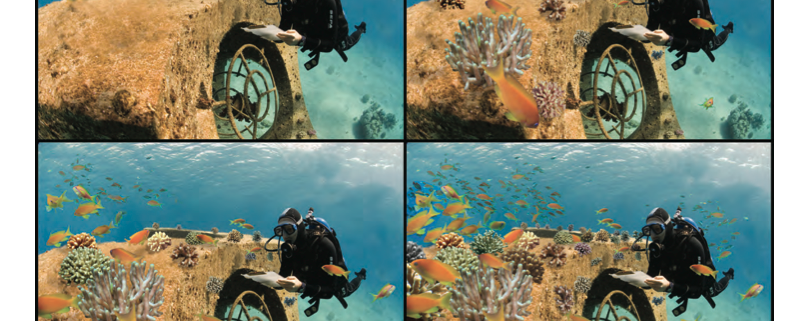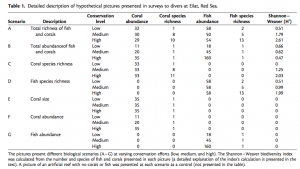Artificial Reefs, Biodiversity, and Ecotourism
by Jessica Ann Wingar, RJD Intern
Coral reefs are a very important part of the ecosystem, and over the years, the condition of the world’s coral reefs has changed drastically; this condition has not changed for the better. There are many resources that coral reefs provide to the world. Some of these include tourism value and the fact that they provide a natural nursing area for fisheries. A lot of research has been done on corals and what features of a reef, give the reef more monetary value. This research has found some conflicting results. While, some claim that fish biodiversity is more valued than coral biodiversity, some claim the opposite. Although, this research has looked at many aspects of what makes a reef valuable, not a lot has been done with looking at the value of each component of the biological attributes of a reef. This study aimed to look at different levels of biodiversity in fish and corals, in addition to, looking at each condition under different levels of conservation effort. This study also looked at whether or not artificial reefs could be used to cause an increase in ecotourism across the world.
Researchers from the Ben Gurion University of Negev and the Interuniversity Institute for Marine Sciences at Eliat in Israel created a survey to give to divers in the city of Eliat in Israel to see what monetary values they would put on these artificial reefs. The survey presented a number of different biological conditions of artificial reefs and at varying levels of conservation effort. These biological conditions were coral size, coral diversity, fish abundance, coral abundance, varying numbers of fish and corals, and different levels of biodiversity of fish and coral. The survey also asked about how much money they would be willing to pay for each scenario and why they decided on that monetary amount.
This study showed that many of the divers would be willing to pay money for a more diverse environment that could be created by artificial reefs. The greatest motivation for paying more money was for their own enjoyment, but many of them also wanted to pay money to ensure that the reef would continue to exist. The survey showed that the divers wanted to pay more for fish species richness over abundance and they wanted to pay more for coral abundance rather than species richness.
Studies of this nature are very important because they show how recreational water activities can be used as a catalyst for conservation science. This ecotourism can be used as a tool for people to communicate conservation efforts. If people are willing to pay more for high biodiversity, then that is phenomenal because oceans thrive in higher biodiversity. Despite the fact that artificial reefs could help increase conservation awareness, they can sometimes attract certain types of organisms. Thus, creating a community built around them. Artificial reefs and transplantation of reefs hold a lot of potential to increase biodiversity and the health of today’s oceans.
REFERENCE
Polak, O, and Nadav Shashar. “Economic value of biological attributes of artificial coral reefs.” ICES Journal of Marine Science 70.4 (2013): 904-912.






Leave a Reply
Want to join the discussion?Feel free to contribute!